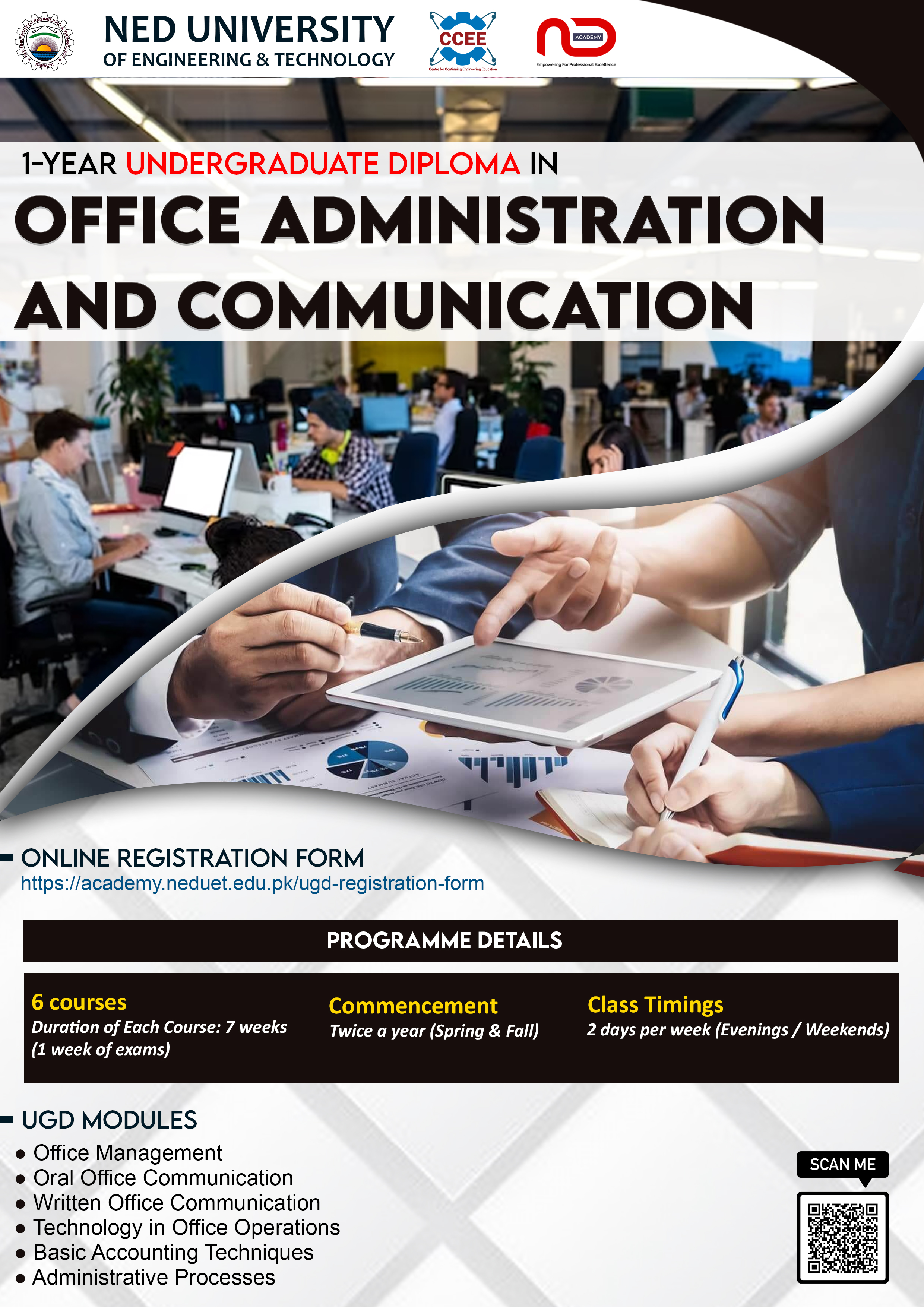DETAILED COURSE OUTLINE
🔷 Office Management
Understanding the Role of Office Management, Historical Evolution and Modern Trends, Importance of Effective Office Management in Organizations, Key Responsibilities of an Office Manager, Organizational Structure and its Impact on Office Management, Effective Communication, Strategies in the Workplace, Interpersonal Skills and Relationship Management, Role of Technology in Modern Communication, Principles of Time Management, Prioritizing Tasks and Setting Goals, Delegation Techniques, Tools and Software for Task Management, Administrative Functions in an Office Environment, Document Management and Record Keeping, Filing Systems and Data Security, Compliance and Legal Aspects of Office Administration, Building and Leading Successful Teams, Conflict Resolution Techniques, Employee Motivation and Recognition, Creating a Positive Work Environment
🔷 Oral Office Communication
Types of communication: intrapersonal, interpersonal, small group, public, and mass communication, communication process, barriers of communication process, role play practice in official context: company receptionist and client/ customer, head of the department and subordinate work progress, social event of the company etc., effective telephoning skills: greetings, introducing yourself and the company, clarifying purpose of the call, handling inquiries ( practice telephoning role play), group discussions, formal presentations, participating in meetings, meeting agenda and minutes practice, meeting ethics, job interview simulations, interview ethics, appropriate vocabulary and grammar guidance of all of the topics.
🔷 Written Office Communication
Importance of written communication, differences between oral and written communication, writing simple, compound and complex sentences (Practice), paragraph writing: writing topic sentence and details(practice), coherence and cohesion in writing, notes taking, principles of effective written communication (7Cs), resume and job letter, routine emails, letters and memos writing: inquiry, reply to inquiry, order, complaint, (Direct Approach) appropriate vocabulary and grammar guidance of all of the topics.
🔷 Technology in Office Operations
Evolution of Technology in Office Operations, Overview of Modern Office Technology, Role of Technology in Enhancing Productivity, Ethical Considerations in Office Technology, Email Management and Best Practices, Collaboration Platforms (e.g., Microsoft Teams, Slack), Video Conferencing and Virtual Meetings, Efficient Use of Instant Messaging Apps, Introduction to Office Suites (e.g., Microsoft Office, Google Workspace), Project Management Tools, Customer Relationship Management (CRM) Systems, Document Management Systems, Importance of Cybersecurity in the Office Environment, Data Protection and Privacy, Common Cyber Threats and Prevention, Employee Training for Cybersecurity Awareness, Artificial Intelligence and Machine Learning, Internet of Things (IoT) in the Office, Augmented Reality (AR) and Virtual Reality (VR) Applications, Future Trends in Office Technology
🔷 Basic Accounting Techniques
Introduction to Accounting Principles, Double-Entry Accounting System, Types of Accounts and Transactions, The Accounting Equation, Journal Entries and Posting to Ledger, T-Accounts and Trial Balance, Adjusting Entries and Accrual Accounting, Closing Entries and the Accounting Cycle, Income Statement: Revenue, Expenses, and Net Income, Statement of Retained Earnings, Balance Sheet: Assets, Liabilities, and Equity Cash Flow Statement Basics, Ratio Analysis: Liquidity, Profitability, and Solvency Ratios, Trend Analysis and Common-Size Statements, Interpretation of Financial Statements, Using Financial Ratios for Decision Making, Overview of Accounting Software (e.g., QuickBooks, Xero), Setting up a Chart of Accounts, Recording Transactions in Accounting Software, Generating Basic Financial Reports
🔷 Administrative Processes
Definition and Scope of Administrative Processes, Historical Evolution of Administrative Management, Importance of Effective Administration in Organizations,Role of Administrative Professionals, Strategic Planning in Administration, Setting Objectives and Goals, Organizational Structure and Design,Resource Allocation and Budgeting, Effective Communication Strategies in Administration, Information Flow and Management, Document Control and Record Keeping, Technology Tools for Administrative Communication, Decision-Making Models in Administration, Problem Identification and Analysis, Conflict Resolution Techniques, Ethical Decision-Making in Administration, Quality Improvement in Administrative Processes, Performance Metrics and Key Performance Indicators (KPIs), Monitoring and Evaluating Administrative Processes, Adapting to Change in Administrative Environments


